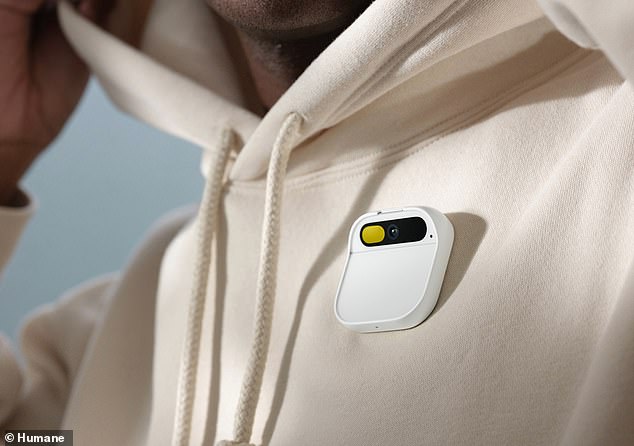The personal assistant in your pocket: Walkie-talkie-style gadget has an AI chatbot that can do everything from ordering a taxi to booking a holiday – and it costs just £159
- The orange gadget was unveiled at the Consumer Electronics Show in Las Vegas
- It works by taking control of all the owner’s online accounts
A walkie-talkie-style gadget with a built-in chatbot is being hailed as the “iPhone of artificial intelligence.”
The Rabbit r1 performs daily tasks for the owner, from asking a simple question to planning and booking an entire vacation.
The striking orange gadget was unveiled at the Consumer Electronics Show in Las Vegas, known for showcasing the future of technology.
The release kicks off the race to create a physical wearable device for chatbots, giving people a digital assistant that does things for them as they go about their daily business.
What’s more, it costs just £159 – a fraction of the price of competing devices, including Humane’s AI Pin, which recently went on sale for £550.
A walkie-talkie-style gadget with a built-in chatbot is being hailed as the ‘iPhone of artificial intelligence’

The R1 – which is now available for pre-order – has a rotating camera for taking photos and for video calls, a 2.88-inch touchscreen, and a large button that also functions as a scroll wheel
The gadget works by taking control of all the owner’s online accounts, requiring him or her to log in and give access to all their profiles in apps like Uber and Deliveroo.
US start-up Rabbit said it would always seek permission and clarification when carrying out any task, especially when it comes to payments.
In a keynote address, founder Jesse Lyu demonstrated the device by asking him to design an itinerary for a trip to London for him and book the trip.
The idea behind it is to prevent people from having to scroll through hundreds of different apps on their smartphones – and instead offer one big super app.
The R1 – which is now available for pre-order – has a rotating camera for taking photos and a 2.88-inch touchscreen for video calls, and a large button that also functions as a scroll wheel.
Several tech startups are in a race to create a physical device for AI chatbots, with investors banking on big profits if they back the right gadget.
The Rabbit is the first to create a handheld device for them, similar to a smartphone.
It’s much cheaper than other similar AI-enabled everyday products like Meta’s £245 Rayban smart glasses with built-in chatbot and the £550 Humane AI Pin, a brooch-like device that projects a screen with a digital assistant on your hand .

US startup Rabbit said it would always seek permission and clarification when performing any task, especially when it comes to payments

It’s much cheaper than other similar everyday products that support AI, such as Meta’s £245 Rayban smart glasses with built-in chatbot and the £550 Humane AI Pin (pictured), a brooch-like device that projects a screen with a digital assistant at hand
OpenAI boss Sam Altman is also reportedly already in talks to design a separate hardware product for the digital assistant with Apple’s former design chief behind the iPhone, Jony Ive.
However, he has previously said that the company behind ChatGPT was only taking small steps to give AI tools the power to take actions in the real world.
However, experts have warned that the trend of giving chatbots so much power is putting users at risk.
An article recently published by the Center for AI Safety warned: ‘AI agents can be given goals such as winning games, making profits in the stock market or driving a car to a destination.
‘AI agents therefore pose a unique risk: humans can build AIs that pursue dangerous goals.’
